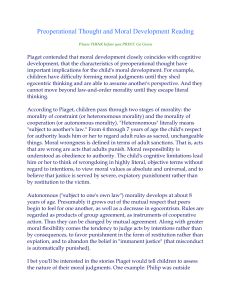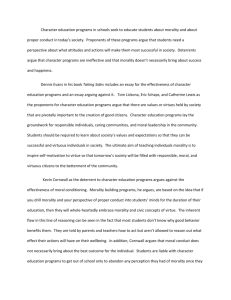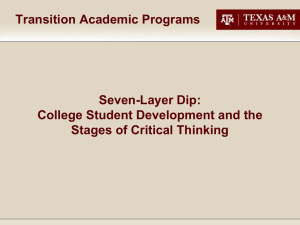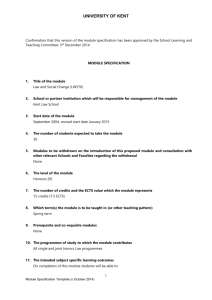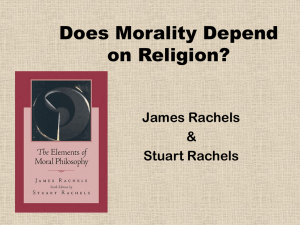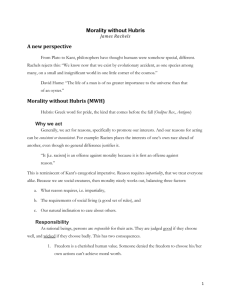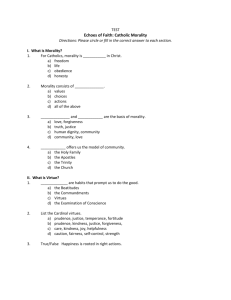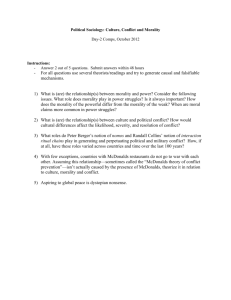Josh Gray Neg
advertisement
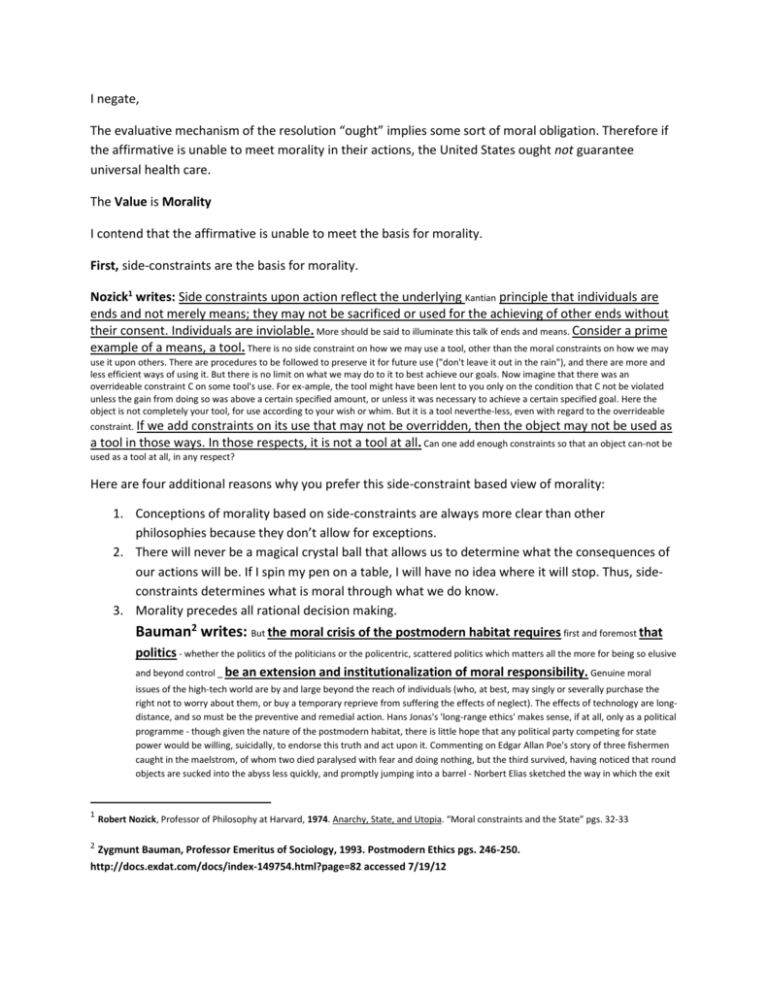
I negate, The evaluative mechanism of the resolution “ought” implies some sort of moral obligation. Therefore if the affirmative is unable to meet morality in their actions, the United States ought not guarantee universal health care. The Value is Morality I contend that the affirmative is unable to meet the basis for morality. First, side-constraints are the basis for morality. Nozick1 writes: Side constraints upon action reflect the underlying Kantian principle that individuals are ends and not merely means; they may not be sacrificed or used for the achieving of other ends without their consent. Individuals are inviolable. More should be said to illuminate this talk of ends and means. Consider a prime example of a means, a tool. There is no side constraint on how we may use a tool, other than the moral constraints on how we may use it upon others. There are procedures to be followed to preserve it for future use ("don't leave it out in the rain"), and there are more and less efficient ways of using it. But there is no limit on what we may do to it to best achieve our goals. Now imagine that there was an overrideable constraint C on some tool's use. For ex-ample, the tool might have been lent to you only on the condition that C not be violated unless the gain from doing so was above a certain specified amount, or unless it was necessary to achieve a certain specified goal. Here the object is not completely your tool, for use according to your wish or whim. But it is a tool neverthe-less, even with regard to the overrideable constraint. If we add constraints on its use that may not be overridden, then the object may not be used as a tool in those ways. In those respects, it is not a tool at all. Can one add enough constraints so that an object can-not be used as a tool at all, in any respect? Here are four additional reasons why you prefer this side-constraint based view of morality: 1. Conceptions of morality based on side-constraints are always more clear than other philosophies because they don’t allow for exceptions. 2. There will never be a magical crystal ball that allows us to determine what the consequences of our actions will be. If I spin my pen on a table, I will have no idea where it will stop. Thus, sideconstraints determines what is moral through what we do know. 3. Morality precedes all rational decision making. Bauman2 writes: But the moral crisis of the postmodern habitat requires first and foremost that politics - whether the politics of the politicians or the policentric, scattered politics which matters all the more for being so elusive and beyond control _ be an extension and institutionalization of moral responsibility. Genuine moral issues of the high-tech world are by and large beyond the reach of individuals (who, at best, may singly or severally purchase the right not to worry about them, or buy a temporary reprieve from suffering the effects of neglect). The effects of technology are longdistance, and so must be the preventive and remedial action. Hans Jonas's 'long-range ethics' makes sense, if at all, only as a political programme - though given the nature of the postmodern habitat, there is little hope that any political party competing for state power would be willing, suicidally, to endorse this truth and act upon it. Commenting on Edgar Allan Poe's story of three fishermen caught in the maelstrom, of whom two died paralysed with fear and doing nothing, but the third survived, having noticed that round objects are sucked into the abyss less quickly, and promptly jumping into a barrel - Norbert Elias sketched the way in which the exit 1 2 Robert Nozick, Professor of Philosophy at Harvard, 1974. Anarchy, State, and Utopia. “Moral constraints and the State” pgs. 32-33 Zygmunt Bauman, Professor Emeritus of Sociology, 1993. Postmodern Ethics pgs. 246-250. http://docs.exdat.com/docs/index-149754.html?page=82 accessed 7/19/12 from a nonexit situation may be plotted. The survivor, Elias suggests, “began to think more coolly; and by standing back, by controlling his own fear, by seeing himself as it were from a distance, like a chessman forming a pattern with others -on a board, he managed to turn his thoughts away from himself to the situation in which he found himself... Symbolically representing in his mind the structure and direction of the flow of events, he discovered a way of escape. In that situation, the level of self-control and the level of process-control were ... interdependent and complemen tary.'s” Let us note that Poe's cool and clever fisherman escaped alone. We do not know how many barrels there were left in the boat. And barrels, after all, have been known since Diogenes to be the ultimate individual retreats. The question is - and to this question private cunning offers no answer -- to what extent the techniques of individual survival (techniques by the way, amply provided for all present and future, genuine and putative maelstroms, by eager-tooblige-and-profit merchants of goods and counsels) can be stretched to-embrace the-collective survival.-The-maelstrom-of the kind we are in - all of us together, and most of us individually - is so frightening because of its tendency to break down the issue of common survival into a sackful of individual survival issues, and then to take the issue so pulverized off the political agenda. Can the process be retraced? Can that which has been broken be made whole again? And where to find an adhesive strong enough to keep it whole? If the successive chapters of this book suggest anything, it is that moral issues cannot be 'resolved', nor the moral life of humanity guaranteed, by the calculating and legislative efforts of reason. Morality is not safe in the hands of reason, though this is exactly what spokesmen of reason promise. Reason cannot help the moral self without depriving the self of what makes the self moral: that unfounded, nonrational, un-arguable, no-excuses-given and noncalculable urge to stretch towards the other, to caress, to be for, to live for, happen what may. Reason is about making correct decisions, while moral responsibility precedes all thinking about decisions as it does not, and cannot care about any logic which would allow the approval of an action as correct. Thus, morality can be `rationalized' only at the cost of self-denial and self attrition. 4. You can always try and solve for any negative consequences later, using a moral action. Thus, the Standard is Respecting Side-Constraints to Action I contend that the affirmative cannot achieve morality because it violates side-constraints to action. First, people must knowingly and willfully commit to an action or it cannot be done because they are being used as means to an end. Velasquez3 writes: Kant’s second version of the categorical imperative implies that we should not use people as objects, as things whose only function is to satisfy our desires. Instead, he claims, morality requires that we always give others the opportunity to decide for themselves whether or not they will join us in our actions. This rules out all forms of deception, force, coercion, and manipulation. It also rules out all the ways we have of exploiting other people to satisfy our own desires without their free consent. Moreover, the second version implies that we should promote people’s capacity to choose for themselves. It also implies that we should strive to develop this capacity in ourselves and in those around us (for example, through education). Again, some examples may clarify what Kant has in mind in this second version. To treat a person as a means is to use the person to achieve my personal interests. In effect, this second version says that we should treat people only as they freely and knowingly consent to be treated, not merely as a means to my own goal. Kant would say that it is For Kant, to respect a person as an end is to respect her capacity to freely and knowingly choose for herself what she will do. wrong to force or to manipulate a person into doing something because in manipulating or forcing a person I am failing to treat the person as she has freely and knowingly consented to be treated. 3 Manuel Velasquez, Moral Philosopher, Mar. 6, 2007. Philosophy: A Text with Readings, pg. 460 “Ethics”. http://books.google.com/books?id=BrSYXnrqInkC&pg=PA460&lpg=PA460&dq=manuel+velasquez+%22kant's+second+version+of+the+categori cal+imperative%22&source=bl&ots=DWSdDcAwsE&sig=BsdpAv482LXQNpHPoBROul4wq8&hl=en&sa=X&ei=AHUIUKydFNGsqAGVl7nfBA&ved=0CCgQ6AEwAA#v=onepage&q=manuel%20velasquez%20%22kant's%2 0second%20version%20of%20the%20categorical%20imperative%22&f=false accessed 7/19/12 As long as I prove that universal healthcare violates a side constraint in at least one way, you vote neg. Universal Health Care violates a side-constraint in three ways: 1. They are coerced to purchase health care and thus do not have an opportunity to decide for themselves. This does not meet the requirement of morality 2. Since universal healthcare is funded through taxes, it uses the citizens of the United States as means to the end of universal healthcare. People are also coerced into paying taxes for this even though they may not need this form of healthcare. 3. The vast majority of people have not consented to be treated this way. UHC is merely a goal of the government and thus is not immoral. Many people are fighting against forms of UHC such as the ACA. And, no social entity can coerce a person for the greater good, due to side-constraints set by morality Nozick 24 continues: Side constraints express the inviolability of other persons. But why may not one violate persons for the greater social good? Individually, we each sometimes choose to undergo some pain or sacrifice for a greater benefit or to avoid a greater harm: we go to the dentist to avoid worse suffering later; we do some unpleasant work for its results; some persons diet to improve their health or looks; some save money to support themselves when they are older. In each case, some cost is borne for the sake of the greater overall good. Why not, similarly, hold that some persons have to bear some costs that benefit other persons more, for the sake of the overall social good? But there is no social entity with a good that undergoes some sacrifice for its own good. There are only individual people, different individual people, with their own individual lives. Using one of these people for the benefit of others, uses him and benefits the others. Nothing more. What happens is that something is done to him for the sake of others. Talk of an overall social good covers this up. (Intentionally?) To use a person in this way does not sufficiently respect and take account of the fact that he is a separate person,' that his is the only life he has. He does not get some overbalancing good from his sacrifice, and no one is entitled to force this upon him least of all a state or government that claims his allegiance (as other individuals do not) and that therefore scrupulously must be neutral between its citizens. The affirmative violates multiple side-constraints to action and thus cannot achieve morality. Onto the aff. 4 Ibid.

